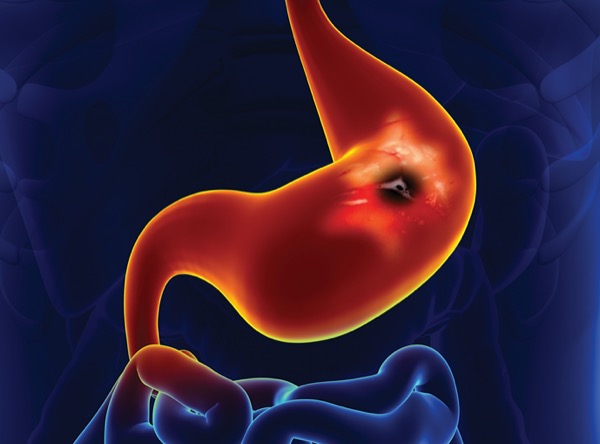CHARLOTTE, N.C.—Endoscopic management of peptic ulcer disease with adherent blood clots may be superior to conservative management with respect to rebleeding, mortality and the need for surgery, according to a new systematic review and meta-analysis.
Since 2005, studies comparing endoscopic and conservative management of peptic ulcer disease have reported conflicting results, some finding endoscopic management more beneficial for certain outcomes while others finding no difference. The American College of Gastroenterology’s 2021 guidelines panel could not reach an agreement to advocate for or against the use of endoscopic therapies (Am J Gastroenterol 2021;116[5]:899-917).
“Therefore, we performed a comprehensive systematic review and meta-analysis to compare the endoscopic and conservative therapies for management of bleeding ulcers with adherent clots,” said Azizullah Beran, MD, a gastroenterology fellow at the University of Toledo, in Ohio, presenting the research at the 2022 annual meeting of the American College of Gastroenterology (oral abstract 6).
Dr. Beran and his co-investigators searched MEDLINE, EMBASE and the Web of Science databases for all published studies comparing endoscopic and conservative therapies through May 15, 2022. The comparison groups were patients who received endoscopic therapy plus medical therapy with acid suppression (endoscopic therapy) and those who received medical therapy alone (conservative therapy).
The investigators found 11 studies, nine randomized controlled trials (RCTs) and two observational studies, that met their inclusion criteria. The 11 studies included 839 patients total; 434 underwent endoscopic therapy and 405 received conservative therapy.
“The endoscopic therapy group underwent clot removal and treatment of the underlying lesion with thermocoagulation, electrocoagulation, injection of sclerosants or hemoclipping,” Dr. Beran said.
The outcomes of interest were rebleeding, subsequent need for surgery and mortality.
Considering a P value of less than 0.05 significant, the differences were statistically significant for all three outcomes. Specifically, 8.1% and 20.7% of the endoscopic and conservative groups had rebleeding (P=0.01); 4.3% and 9.9% needed surgery (P=0.04); and 3.7% and 8% died (P=0.04).
However, when they performed a subgroup analysis of RCTs alone, they found no significant difference between the endoscopic and conservative groups. “There were lower trends in rebleeding and need for surgery for the endoscopic therapy group, but that did not reach statistical significance, and mortality was almost similar between the two groups,” Dr. Beran said.
He acknowledged that a major limitation of the study was the use of heterogeneous studies, both RCTs and observational studies. “Notably, the reduction in rebleeding, mortality and the need for surgery in the endoscopic therapy group compared to conservative therapy was mainly driven by observational studies, which are more susceptible to methodological problems like selection and confounding biases,” Dr. Beran said.
Another limitation was the relatively small sample sizes and low event rates in the RCTs.
Dr. Beran concluded that their overall analysis showed endoscopic therapy was associated with lower rates of rebleeding, need for surgery and mortality, but that “large-scale RCTs are needed to answer this clinically significant question.”
Jury Still Out
Daniel Pambianco, MD, a gastroenterologist and managing partner of Gastro Health in Charlottesville, Va., and one of the moderators of the plenary session in which Dr. Beran presented his study, asked Dr. Beran what he would do with peptic ulcer patients with adherent clots based on the results of this study. Dr. Beran replied that even with the subgroup analysis, there were lower trends in rebleeding and the need for surgery, and that endoscopic management might be beneficial. “Personally, I would treat it, but I would not say that conclusively,” Dr. Beran said, stressing the need for “a large-scale RCT [to] answer the question.”
Brooks D. Cash, MD, the chief of the Division of Gastroenterology, Hepatology and Nutrition at the McGovern Medical School of The University of Texas Health Science Center at Houston, who also co-moderated the session, said it was unfortunate that the inclusion of observational studies appears to have confounded the results. “So, what looks like something that might have had an impact on the guidelines probably will not,” Dr. Cash said. “But it is more information on a controversial topic, and it does appear that there is a trend toward improving outcomes with removing adherent clots.”
—Monica J. Smith
Drs. Beran, Cash and Pambianco reported no relevant financial disclosures. Dr. Cash is a member of the Gastroenterology & Endoscopy News editorial board.
{RELATED-HORIZONTAL}
